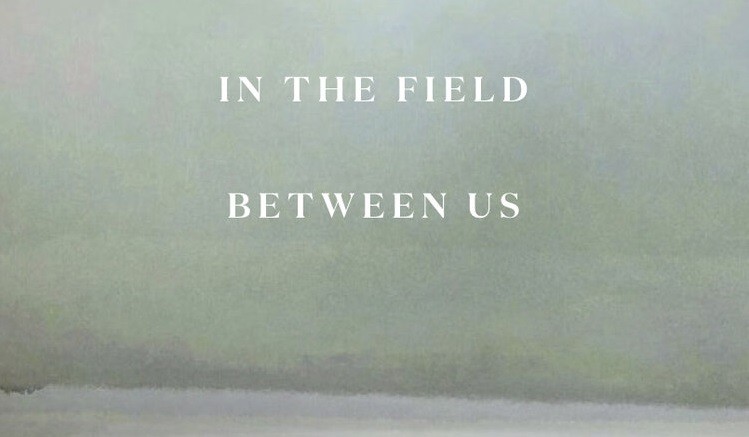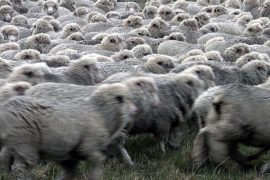Molly McCully Brown and Susannah Nevison sing through the pages of In the Field Between Us. In poems that read like letters (opening “Dear M—” and “Dear S—”) yet reverberate like hymns, they perch in pews, engaging in a sort of antiphon across the center aisle. Looking each other in the eye and activating their natural resonators, they sing of pain and redress, of bodies that fail and surprise, of their longing to be swallowed whole by the world’s wildness.
In a handful of interstitial stanzas aimed at the rafters (“Dear Maker”), M— and S— take their place together in the choir loft. Side-by-side, arm-in-arm, the supplicants lift their address to an dramatic deity whose fingerprints their bodies bear. With one poetic voice, they sound out the contours of holy presence, sense divine absence within the rests and ask creation’s architect to unroll the blueprints and prove affection’s place in making humans.
In the Field Between Us bears eternal relevance from its first lines. Implicitly refuting a division that is often attributed to C.S. Lewis and so widely held—“You are a soul. You have a body.”—Brown and Nevison work towards recovering the unity of personhood in the face of functional Gnosticism. What happens at the level of skin and bone reshapes the human spirit—and vice versa.
The poets’ speakers bear distinct scars, inside and out, their bodies living records of disability and chronic pain. M— and S— know what it means to be cut and caressed in the name of promises made and never kept. Tenderly and soberly, the pair guides readers through four sections: Aftermath, Recovery, Operating Room, Pre-Op Holding Room. Each stage breaks the skin to convey profound truths about embodiment; taken together, they preach a glorious gospel of belonging. Our common incarnation binds our souls together.
S—’s opening dispatch draws readers to their conversation in media res. She writes stripped of pretense or posturing; in M—’s company, S— fears very little. Free to sift sensations and interpret her own dreams, she relays a vision whose plain reading suggests “an elegy.” Yet, clear of “all our dead and heavy” limbs, “it sounds exactly like a praise song.”
The dream where I’m legless
isn’t a nightmare, and I’m not
afraid—there’s a light and a river
and everything is exactly
how I’d hoped.
Here, S— first embraces the tension both writers will hold throughout, wondering aloud if their physical forms were intended for something more—yet expressing affection for their present-tense selves. These are the only bodies the correspondents know, the ones which made them who they are.
In her first poem, M— initially feints toward the desire for restoration, for a merry and mythic return to “wherever it is / we were made for first,” a realm in which “everything floats and women / are part horse or fox.” And yet she confesses:
We’d miss it here eventually.
The boat that brought us, I believe
in it.
M— and S— are always abandoning illusory control. This open-handedness colors their degree of faith in doctors who play God without owning equal omniscience. Recognizing similar confidence but little of the divine love, M— concludes an early epistle:
Now
some maker readies the camera, readies
the compass, readies the knife, and all of me
rallies to pull the curtains closed, to cover my face.
The speakers’ lack of control ushers them between states, squeezing through liminal spaces where embodiment and ethereality face one another. In one passage, M—’s acute self-knowledge dissolves into lucid curiosity. She resembles a sleepwalker whose body asks questions she can’t answer.
Half the nights
I don’t know my body when I wake to it,
and there’s grief in the returning, remembering
pain, familiar as a fist I know. In the morning,
I wake and my body wears bruises I didn’t make,
or don’t remember making. Did it take off without me,
board a bus from this new city, looking for home,
or glamour, or you? I wouldn’t rule it out,
my body’s always wished it were wilder.
Vulnerability turns visceral as M— and S— struggle to separate their bodies from the treatments they receive. Medical interventions introduce displacement in ways the body could never manifest alone. S— expresses a desire to retreat into a more elemental state:
I want to go back to before
I knew my body as shrapnel
and shred, a knife’s serrated
edge, slick blade halving
the world as I cut through it.
It’s impossible to go back,
but I want it anyway, endlessly,
the moment I’m a small and tender
beast, the fur of me still matted
by birth’s strange coincidence.
M— and S— interrogate the fraught relationship between humans and machines, hovering above their bodies stretched across operating tables. These episodes are at once out-of-body and fully enfleshed. When they invoke implements, you practically picture flesh fusing over steel, one and not the same.
The pair strives to distinguish between medical equipment in the grip of would-be healers and themselves as instruments in the hands of an imagined Maker. Their “Dear Maker” poems suggest that a God-like figure has some explaining to do—if not for the execution shown in creation, then at least for the intention.
“Listen, if I can’t know / what you first / whittled me out of / I would like to see / the knife,” they write.
Often, the pair relies on creative metaphors as they pose their questions:
My body is a violin
somebody shaped in the first place, and the problem
is that every instrument has its own logic, fits the scale
strangely if you hold it wrong. Mostly I’m not
making any music.
In one “Dear Maker” poem, the joint narrator feels lost in translation, the body “a transitory letter, a note / you sent, a piece of paper / covered with your writing.” This yearning meets its match throughout the book. What relief and wholeness the letter writers experience arrives through words in all their reflexive and restorative power. The language M— and S— trade and twine shapes their sense of embodiment; the bodies the speakers inhabit lead them into a specific spiritual grammar.
The book’s final poem-letters witness discontent and affection moving toward each other, making the gestures of reconciliation. Coming home to ourselves only happens when we perceive our beauty and specificity through another’s words, they propose.
Indeed, words become means and end as M— and S— model what it’s like to actually converse with another person, to find yourself remade from common DNA. Finishing one another’s sentences and speaking into the space where unvoiced needs live and linger, they gradually align while remaining distinct. Giving the book its name, S— practices the art of naming one another:
For want of arrival, a clear
syllable that opens across
the room or the field
between us, give me
instead the earth and silt
our names become
with each labored step
In 2020, even the marginally aware think about their bodies—and their neighbors’ bodies—with newfound sobriety. (Readers interested in plumbing the depths of physical possibility and limitation would do well to read Brown’s recent essay collection, the equally-impressive Places I’ve Taken My Body.) While M—’s and S—’s bodies are fully their own, In the Field Between Us releases readers to see pain and deficit are, as the band Vampire Weekend puts it, “as natural as the rain.” Brown and Nevison encourage readers to replace what they lack—and delight in their fleshiness—through words.
Across a late page, S— writes:
I’d like to think as we lift
ourselves to go, in this newness
we leave it all behind—a grave, a name,
a birthday, a face—in favor
of what we know is ours
to make, this record
of our speech, our grief
Through a shared language of loss and grace, mercy and empathy, In the Field Between Us shows how any of us somewhere in the process of fully knowing ourselves can make peace with our bodies—or build each other new ones.





